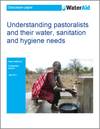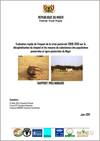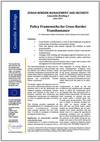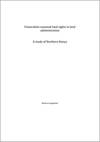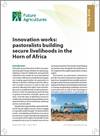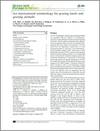Pastoralists depend on water for sustaining herds, as well as for their own health and survival. When water availability declines, pastoralists have to move their herds elsewhere to avoid their depletion and consequent impoverishment. Water for livestock needs has received little attention from policy makers and practitioners in the water sector.
This policy brief summarizes the findings from a literature review and research in the districts of Longido and Hanang Districts in Northern Tanzania. It recognises the rationale of pastoral livelihood systems, and calls for further research and support to develop water supply, sanitation and hygiene solutions that are in harmony with such a livelihood system.
Year of publication: 2011Organization: WaterAid
Topic: Resilience
Language: English
Type of document: Technical, Policies and legislation
Geographical coverage: Eastern Africa
Au Niger, la campagne agropastorale 2009-2010, a été caractérisée par un déficit fourrager jamais égalé au niveau de toutes les régions du pays. Cette situation a entrainé en 2010 une crise pastorale sévère, face à laquelle des initiatives pour l’atténuation de ses effets ont été pensées et mises en oeuvre. En plus, de l’importance du déficit fourrager, la réaction tardive des autorités pour juguler la crise ainsi que l’installation tardive de la saison des pluies en zone pastorale, ont aggravé la situation avec des pertes énormes du capital bétail. Prenant en compte de cette douloureuse expérience l’Etat du Niger à travers le Ministère en charge de l’Elevage et ses partenaires au développement ont initié la présente étude afin de faire une évaluation rapide de l’impact de cette crise sur le monde pastoral et agropastoral. L’exercice a consisté à collecter et à analyser des informations qualitatives et quantitatives auprès des ménages sinistrés au niveau des sites retenus. Le présent document fait l’économie des principaux résultats inhérents à l’étude.
Year of publication: 2011Organization: Individual authors
Topic: Climate change, Economy, Food security
Language: Français
Type of document: Technical
Geographical coverage: West Africa
In this video Maasai elders in Kenya recall the devastation they have seen caused by rinderpest, or cattle plague. For millennia, the virus was a threat to animal health and human livelihoods, until a global FAO-led programme was successful in eradicating it in 2011.
Year of publication: 2011Organization: Food and Agriculture Organization of the United Nations (FAO)
Topic: Healthcare, Resilience
Language: English
Type of document: Videos
Geographical coverage: Eastern Africa
This briefing provides arguments for the establishment of a collaborative crossborder transhumance management strategy between the two countries. It draws on examples of initiatives developed in West Africa.
Year of publication: 2011Organization: European Union (EU)
Topic: Conflict, Indigenous knowledge, Innovation, Organization, Participation
Language: English
Type of document: Policies and legislation
Geographical coverage: West Africa, Eastern Africa
This publication produces a series of papers on land use administration, land use change, securing of rights to resources and other in Laikipia, Kenya.
Year of publication: 2011Organization: Individual authors
Topic: Land
Language: English
Type of document: Technical
Geographical coverage: Eastern Africa
This policy brief summarises lessons from innovations by pastoralists in Ethiopia and Kenya in three critical areas that are shaping the future of pastoralism in the Horn of Africa: land deals and access to high value fodder; commercialisation and markets; and peace-building.
Year of publication: 2011Organization: Future Agricultures Consortium
Topic: Innovation
Language: English
Type of document: Technical, Policies and legislation
Geographical coverage: Eastern Africa
This publication presents terms and definitions to ensure clear international communication regarding grazing lands and grazing animals.
Year of publication: 2011Organization: Individual authors
Topic: Environmental services
Language: English
Type of document: Scientific
Geographical coverage: Global
The needs of nomadic pastoralists are generally complex and those relating to the provision of education need special attention due to the many challenges facing the children and the communities. Recognizing this, the Ministry of Education in Kenya, in collaboration with its development partners, has drafted this policy framework to enable Kenya’s nomadic communities to access basic education and training.
The Ministry acknowledges that education cannot be provided to nomadic communities without taking their socio-cultural and other developmental concerns into consideration. Therefore, it proposes multiple approaches such as mobile schools, non-formal schools, formal schools, and boarding schools, as well as creating linkages between these approaches. The policy framework is therefore aimed at providing broad guidelines for the coordination and harmonization of efforts in the delivery of quality educational services to nomadic communities.
Year of publication: 2011Organization: Individual authors
Topic: Education, Gender and youth, Social services
Language: English
Type of document: Policies and legislation
Geographical coverage: Eastern Africa


